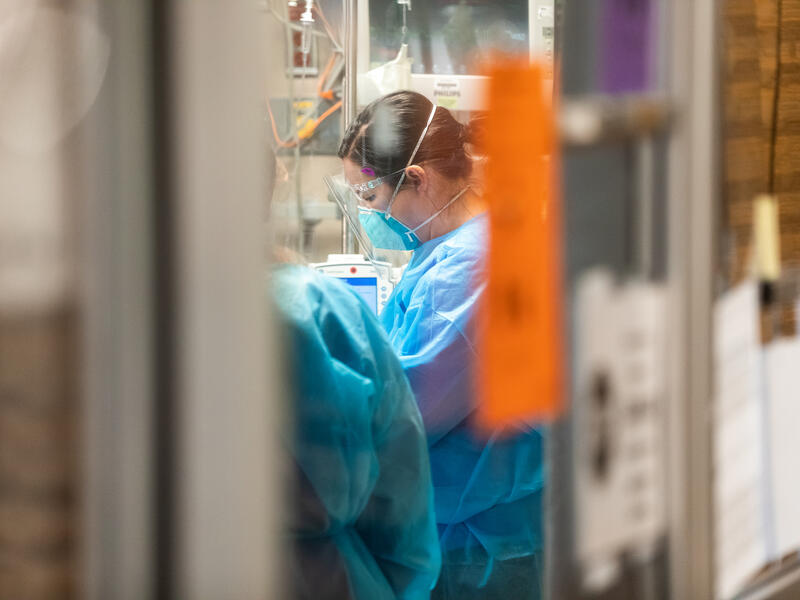Sanford Health is still projected to see a continued surge in COVID-19 cases late September into early October, but there are ways to avoid your own trip to the hospital.
Numbers of hospitalized patients, patients in the intensive care unit and patients on ventilators have increased significantly week over week. They are expected to peak early this fall before they begin to drop off.
As of Sept. 9, that number approaches 150 total COVID-19 patients in Sanford Health hospitals. An overwhelming majority of those patients didn’t get the vaccine.
“That number is where we expected to be as numbers continue to increase,” said Chief Physician Jeremy Cauwels, M.D.
Watch: Dr. Cauwels joined Sanford Health News for a Facebook Live Q&A, Sept. 9, 2021
How we can avoid a surge
The first way to help avoid a COVID-19 surge: vaccination.
“Vaccination is still the best way that we know of to avoid the suffering and possible death that’s associated with getting COVID for your first time,” Dr. Cauwels said.
What your body does after that really depends on how much you’ve prepared.
“If you’ve prepared and trained your body to see the virus by vaccinating yourself, you’re probably going to be able to fight it off without being hospitalized.”
The proof is in the numbers for those who opt not to get the vaccine.
“If you’re not willing to do that training ahead of time, then the possibility that you could end up in the hospital increases fairly dramatically, and the possibility that you could die from this increases very dramatically,” Dr. Cauwels said. “And those are the situations we’d like to avoid.”
Another option: monoclonal antibodies.
This is an outpatient therapy Sanford offers to treat COVID-19-positive patients at a higher risk for hospitalization.
It’s a monoclonal antibody, made synthetically to be directed against the coronavirus.
“It’s the antibody that the body doesn’t have — or have enough of, yet — to fight directly against that COVID infection,” Dr. Cauwels explained.
Rather than waiting for our bodies to generate these antibodies, he said they can be infused directly.
“It’s been shown to be remarkably effective for eliminating the need for people to go from ‘I’m sick at home’ to ‘I’m sick in the hospital’ and prevent that need for admission to the hospital and admission to intensive care units,” he said.
“It has been very important for us to talk to our doctors, talk to our nurses, and now talk to our patients about the fact that if you get diagnosed, ask: ‘Do I qualify for one of these antibody cocktails?’ because those antibody cocktails are the types of things that can decrease your risk of having to be admitted to the hospital later.”
‘Breakthrough infections’ will happen
A breakthrough infection occurs after you’ve been vaccinated and can present itself in a variety of ways including no symptoms at all, or a mild, cold-like infection or hospitalization.
He references the situation in Israel which, according to the latest data, joins the United States in having one of the worst rates of COVID-19 per million in the entire world.
“Look at the Israeli data versus the United States data in that highly vaccinated population,” Dr. Cauwels said. “If you look at the number of people who have died per a million people in Israel, it’s still less than half of the people who have died in the United States which means that the vaccine is still doing a very good job of preventing hospitalization and death, even in people who have a breakthrough infection, which is exactly what you would expect a good vaccine to do.”
What about in-person gatherings?
If you’re planning an event and safety is your top priority, Dr. Cauwels encourages you to think about the rise in cases before gathering with individuals who are not vaccinated and most likely won’t be wearing a mask.
The numbers show the circulating amount of COVID-19 in the community is high.
In fact, Dr. Cauwels said more than 1 out of every 20 patients for an elective surgery is testing positive for COVID-19.
“If you invite 20 people to a meeting or event, there’s a good chance one of them has COVID-19 and doesn’t know it,” he said. “I think that’s a really important rule of thumb as you’re planning things.”
Admittedly, he’s most comfortable being with adolescents and adults he knows are vaccinated.
“If I go to a large indoor venue, I’m going to wear a mask. I’m a little more flexible in an outdoor venue, depending on how much space I can put between me and most of the other people,” he said.
High school football is one outdoor event he enjoys attending.
“I don’t sit in the stands. That’s my own personal assessment of the risk, and I know I have friends that feel very differently about that and I’m OK with that.”
He says to make your own assessment and determine the risk you’re willing to tolerate.
Information in this story was accurate when it was posted. As the COVID-19 pandemic changes, scientific understanding and guidelines may have changed since the original publication date.
Read more
…
Posted In COVID-19, Expert Q&A, Immunizations

